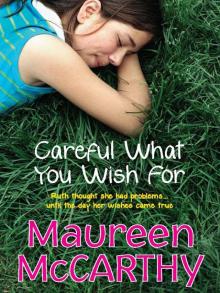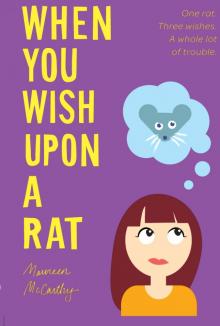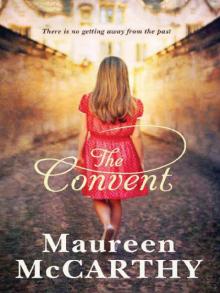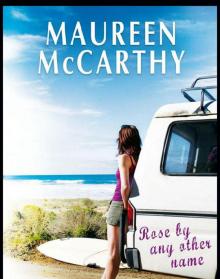- Home
- Maureen McCarthy
Queen Kat, Carmel and St Jude Get a Life Page 5
Queen Kat, Carmel and St Jude Get a Life Read online
Page 5
‘Pretty basic. You’ll want to bring your own stuff, I’m sure,’ she said.
‘No. It’s fine,’ I mumbled back. A look of bewilderment suddenly suffused Dad’s face. Now that it was time for him to leave he was having second thoughts.
‘So how are Mum and Dad?’ he asked Katerina. It was as though he couldn’t quite believe that anyone could be so snooty and aloof.
‘Just fine,’ she snapped tossing her head without looking at him. I cringed.
‘He did a little op for me last year, you know,’ Dad went on, smiling blindly, ‘had a mole out that looked a bit dangerous.’
I turned away, unable to bear it. It’s bad enough when my parents behave in their usual embarrassing, small-town way. It’s a lot worse seeing them flounder. Dad had no idea how to deal with this little snob. Nor did I, of course, but at least I knew to shut up.
The cases were dumped on the floor.
‘Can I see the kitchen?’ I asked desperately. ‘Dad might want a drink or something before he goes.’
‘Of course,’ her mouth twisted into a cold little laugh, ‘this way.’ We all edged our way out of the room and into the hallway and she led the way through a large lounge room covered with horrible purple carpet. It was simply furnished with an old leather lounge suite, a piano, a stereo and a couple of small tables. Then we were in the kitchen.
‘Someone said you didn’t get into the course you wanted,’ she said off-handedly as she poured a glass of cold water and held it out to Dad. ‘Music, wasn’t it?’
‘Yes. Music. Er, no . . .I didn’t get in.’
‘Hard luck,’ she said, looking at me shrewdly. I turned away. ‘Yeah.’
We waited, listening to Dad gulp down the water. Then she took it from him with a small smile and refilled it, once again quite pleasantly.
‘I guess we’ll talk about everything tonight,’ she said, turning to me again. ‘We’ll have a house-meeting. You know, talk about money, cooking, food, shopping and . . . anything else.’ I nodded. ‘Judith will be back then,’ she added.
‘Yes. Sure,’ I said, not being clear what she was talking about. ‘Er, who’s Judith?’
‘You don’t know Judith!’ she frowned incredulously. I shook my head, bewildered. How could I know who she meant?
‘I’m sorry, I should have told you,’ she said quickly, ‘Judith . . . er, actually maybe her name is Jude. That’s what everyone calls her, I think. She’s from Manella. Dark hair . . . you know. You must know her. Her mother runs that little art shop in the main street.’
‘Oh!’ I said in surprise. ‘Yes, I know who you mean.’ The short, bright-eyed girl who went to the secondary college. Everyone knew she was born in some foreign country, and that her father was dead, and that her mother was good-looking and owned that funny shop in the middle of town. That was about all I knew about her. That and the fact she was known to be a bit strange, sort of an odd-ball, a clever wordy type. So I was going to be living with her too. Another stranger.
There was no house-meeting that night. Katerina left for wherever she was going fairly soon after Dad had gone. And the other girl didn’t come home at all. I didn’t mind it much at first. At least I could breathe easy. There was no one to see how uncomfortable I felt. I took the opportunity to snoop around a bit. The front room I guessed would be Katerina’s. I very gently turned the round knob, took one swift peep through the door, and quickly closed it again. The room was full of lovely things. Mirrors and lace curtains and pastel paintings on the wall. The bed was huge, wrought iron with a white cotton lace cover. There were about six little floral-and-lace-covered cushions bunched around at the top, just like in those magazine pictures of home furnishings. It was any girl’s fantasy room. I stepped away guiltily and wandered back down the hallway and around the rest of the house. The other bedroom was as bare as my own, except that the bed was made up and a few cases and boxes were stacked up against the wall. There were two big posters on the wall, of older men I didn’t recognise. That made me feel a little better. Then I walked out the back to the small concrete yard, which housed an old disused laundry on the left. The fence was high and consisted of old slabs of corrugated iron. I peered through a crack and saw a cobbled laneway and other back gates.
When I turned to the house I was surprised to see that there were wooden steps leading up to another room at the rear of the house. For a few moments I wasn’t game to investigate, but once up there on the little landing I was glad. I could see out over the fence into the other surrounding backyards. The door was locked, but I saw in through the window. It was a long, oblong room. There was a narrow bed, a dressing-table, and all kinds of rocks and stones and pieces of clay, moulded and shaped. I wished suddenly that I could live in this room, that it could be mine. That I could stay out the back here out of everyone’s way and never have to deal with that little blonde princess. And Judith . . . Jude. To think I’d now be living with two people I’d been too shy to speak to at home!
I descended the stairs slowly, trying to ignore the gnawing panic. Why had I come? Why had I been so desperate to leave Manella? At least there I was someone. I had a family of sorts. And I had my music. The singing. I knew I would not fit in here at all.
After a while the panic gave way to a sense of eeriness. To be so suddenly alone in this house I didn’t know. Everything I saw and smelt was unfamiliar. Although there were all kinds of sounds from the street outside, the quietness of the house was overpowering.
There was nothing else to do after a while but sit in the kitchen on one of the cane chairs, rest my elbows on the small wooden table, and watch the sun through the window as it slowly sank. I got out the map Vince had made me. He’d worked out my route to uni. I went over it as a way to calm myself. The next morning I had to walk straight out my front door, turn right, then up to the nearest big road, which would be Lygon Street. There I would catch the tram. It would take me around a sharp corner and up to the university. I would know I was almost there when I saw a big red brick building on my right. I would get used to it all in a couple of days. There was nothing to worry about at all, Vince had said. I would get used to everything.
At first I ignored the piano altogether. Deliberately. Kept getting up from my chair and looking out the window and making myself cups of tea, using the same tea-bag three times. There was a radio on top of the fridge, but I couldn’t get it to work. Then I tiptoed into the lounge room, nervous as a cat, as though I expected someone to be waiting there to pounce on me. It was quite gloomy, but I didn’t think to put on the light. I opened the piano lid and very gently sat down and felt for the keys. Some chords first. Ah . . . the thing was in tune and it had quite a good tone. I wondered who it belonged to. Did she play? Would she mind me using it? F sharp, C, and then some minor chords. They vibrated through my fingers and up into my arms, making me feel better. Slowly I began to play: the sweetest little piece I’d learnt for my exam. I hadn’t played it since that day and it had been my favourite. I loved the lilting melody that ran through it like a scampering animal – a bush rat or possum – stopping here and there to twitch its nose and then hop off again. And the way the sadness running underneath it was introduced so tentatively: almost nothing at first, it slowly built like a gathering storm, stronger and stronger, until by the end of the piece it had completely taken over . . .
I kept playing. One piece after another as the light in the room faded away. I couldn’t find any music to read so I played every single piece I could remember, everything from the most complicated pieces I’d learnt for my exams over the years to bush songs that I’d played for the old people at the Manella nursing home: ‘Click Go the Shears’ and Irish reels that went on and on.
At one stage I thought I heard the lock opening and the front door bang. I jumped up, put down the piano lid quickly and moved away, feeling ridiculous to be so furtive, but unable to help myself. For some odd reason I didn’t want to be caught playing. But the door didn’t open, no one appeared. I venture
d up the darkening hallway to the front door to investigate. It was only a tin can on the front step. Someone must have thrown it there. I picked it up and stood looking out into the grey street. The line of palm trees planted in the nature strip caught my attention. Funny that I hadn’t noticed them when we’d arrived. I stepped out onto the footpath and looked up and down. Everything had become muted in the fading light and whoever had thrown the can onto our tiny verandah had disappeared. Lights were being turned on in the houses opposite. The odd car glided up and down the grey concrete and I could see a few people coming and going from the houses, some getting into cars, others walking about the streets. The palm trees, dotted at even intervals, were rustling slightly with nesting birds. They stood out high and dark and strong against the deepening sky and they gave me heart. Surely they didn’t belong there! Palm trees belong to tropical islands and boats and smiling, dark-skinned people . . . T hey’re right out of place amid all this grey concrete. Like me. And yet they are surviving.
Back inside. The purple carpet looked rich and heavy in the last rays of yellow light trickling in from the west window. I went back to the piano and played a Chopin prelude. Its playfulness brought the twins into my head. I could almost hear them as I ran my fingers over the keys, shouting and laughing and running around. I played on and for a while it was as though I was out in the back room at our old piano, the smell of dry grass and the distinctive sweet smell of the huge peppermint gum just outside wafting in through the flywire, while the boys were mucking around on the steps leading up into the room. I kept moving my hands over the keys, trying to ignore the dam that was getting ready to burst inside me. With a sudden intense physical rush I looked up from the keys, longing with everything that was in me to see those drooping heavy bunches of gum leaves swaying at my window and to hear the excited squabbling voices of my brothers as they teased each other. If I kept playing, I thought, then the feeling would gradually have to fade away. My hands went on moving over the keys, through the bars of music like clockwork. It was as though my hands were disconnected from the rest of me.
I must have cried myself right out because I remember patting my eyes with a third soggy hanky, feeling quite exhausted and numb. After a while I became aware that I was very hungry too. Ravenous. When I looked in the fridge there was nothing to eat and for the first time in my life I wasn’t sure what to do about it. I realised with a small shock that I wouldn’t have felt right about eating anything from the fridge anyway. She hadn’t suggested that I make myself at home and eat her food. I had some money. I should go out and see if I could find a shop open. Alone? At night? The thought terrified me. I picked up my bag and made for the door. But what if I got lost? What if I couldn’t find my way back in the dark? I suddenly remembered the box of things Mum had packed for me. Eggs and chops and some packets of biscuits, cheese and fruit, a whole pumpkin that she’d grown herself. Only that morning I’d watched her packing the box with dismay. How embarrassed I was going to feel arriving with a whole lot of food from the country! I hadn’t known what to say to make her stop. There were jars of preserved fruit and even a lemonade bottle full of fresh milk from the cow Dad had milked that morning. A wave of gratitude flooded me as I made my way into my room, picked up the box, and heaved it into the kitchen.
I unpacked it nervously. There were pots and pans under the sink and cups and plates up on the high shelves. Would it be okay to put these things alongside what was already here? I actually felt desperately like eating something substantial. Something like chops and eggs with perhaps some fried potatoes and tomatoes on the side, but I didn’t dare. The kitchen would fill up with the smell of cooking. And what if that girl came back and found me feeding my face at the table? I was so conscious of being overweight. She’d probably find the sight of me eating really disgusting. She would be one of those people who never thought about food. She would just nibble bits and pieces as she moved through her exciting life. So instead of cooking something I pulled out a packet of dry biscuits and cut slices from the lump of cheese Mum had provided, then smothered all that in home-made chutney and washed it down with still more cups of tea. It was nearly ten and quite dark outside. By this stage, with my hunger at least partially satisfied, I had no idea what else I could do except sit at the table and stare at the things in front of me.
How many times at home had I longed for peace and solitude? How could I have known that it would be so terrible? Every time I moved I heard myself, the scuffing of my own shoes on the floor. I heard the dry biscuits crunching up in my mouth and the sound of my cup being moved and placed on the table. It was like being in a prison. And how slowly the time went. I looked up at the electric clock above the sink and saw that it was ten-thirty. I waited ages before I looked again. In fact I got up, cleared the table, washed my few dishes, and packed away some more food before looking again. Only ten minutes had gone by! I’d never liked TV much, but I suddenly longed to be able to switch one on. To fill up all the empty space of that little house with noise and movement and colour. What if neither of them ever came back?
By eleven anxiety was gnawing away at my insides. In the end I had to make myself get up, sneak into my room, and get my toothbrush. Then I rushed to the bathroom and shut myself in. My blood was racing and my breathing had gone short as I leant back against the door, trying to calm myself. Was I afraid of an intruder? Or of the others getting home and finding me so obviously ill at ease and out of place? But I couldn’t pinpoint my fear to anything specific.
The bathroom was a small, sparkling place all done out in white and blue tiles with deep-blue borders around the skirting boards, window frames, and mirror. What would they say if they saw the bathroom at home? The grime around the basin and bath and the worn squares of lino on the floor, the bundles of stinking wet towels and the smell of boys, their sweat and hair, the foul odour of their socks that were piled up everywhere. This bathroom was so pristine and girly. I bent over the basin and began to scrub my teeth, feeling as clumsy as an elephant. After finishing that I rushed through the kitchen to my room and made up the bed. Then I quickly shut the cupboard door, switched off the light and pulled off my clothes. I put on the stiff new nightie my mother had bought for me, pulled back the bedclothes, and got in. I lay on my back panting a little, as rigid as a corpse, hands folded across my chest, listening to the small, unfamilar sounds in all that silence, hating the hardness of the bed, wondering how I could possibly go on living. I tried to pray.
Dear God help me, help me. Help me cope with all this. Let me go home. Make me confident like that girl. Make her not hate me. Make me lose weight . . . please make me lose weight! Let something awful happen to her so she could see what a nice person I am. No! That’s terrible. Let something happen to me. So I can go home . . .
I thought that I’d be awake all night, that there was no way I’d be able to get to sleep in this terrible bed. But I did. I think I went to sleep quite quickly.
WHEN I WOKE IT WAS MORNING. I LAY IN bed grateful for the wall between myself and whoever was moving around out there. I’d forgotten to shut one of the blinds the night before and so could see the sky outside, grey and overcast. It would be autumn soon, my favourite season. I snuggled down into the bed refusing to let my mind register where I was, instead letting it flit over the bright leaves that fell from the liquidambars and maples in the main street of Manella; the way the green underneath would push up through all the long, brown summer grass in the paddocks out on our farm. Spring and autumn were the best seasons. I loved seeing everything changing slowly before my eyes. A short sharp knock at the door broke into my rambling thoughts.
‘Yes?’ I said timidly, pulling the sheets up to my chin, dreading that anyone, much less the perfect Katerina, should see me in bed.
‘It’s me, Katerina. Do you want a cup of tea?’
‘Er . . . no,’ I threw the blankets back and put my feet on the floor, ‘thank you, but I’ll be up . . .I ’m getting up . . .’
‘Okay
.’ The footsteps disappeared back into the kitchen again. The smell of burnt toast seeped into my nostrils. Did I dare walk out through the kitchen in my old cotton housecoat? No. It would be better to be dressed when I saw that girl again. The denim skirt I’d worn the day before would do. I rummaged through my things and found the wide blue T-shirt that might help hide some of my size, then collected some underwear and a towel. Trying to steady my nerves I let myself out of the bedroom and opened the door into the kitchen.
There were two of them there. Katerina, her hair piled up on top of her head in a messy ponytail, was dressed more or less as the day before, in cut-off jeans and this time a short, flimsy purple T-shirt that showed off her figure. She was standing by the toaster trying to bang something out of it and looking very irate. The other girl was sitting at the table, reading the paper, in a worn pink-checked dressing-gown, a cup of tea in front of her, her long, dark hair half covering her face. They both looked up when I entered the room.
‘Oh, hello,’ Katerina said, sounding really annoyed as she banged the toaster. ‘How did you sleep?’
‘Hi . . . okay . . .’ I replied, ‘er, have you burnt the toast?’
Katerina sniffed dismissively, pulled the plug out and began poking a fork into the toaster. I turned nervously to speak to the other girl and found that I was being stared at.
‘I’m Carmel,’ I said, trying to smile, feeling the hot flush beginning on my neck.
‘Yes, I know,’ the dark girl replied nodding seriously. ‘You sing. I’ve heard you. I’m Jude. Good to see you.’ She paused, then looked away, as though she didn’t quite know what to say next. Should I leave now? Have my shower?
‘You want a cup of something?’ Jude asked, waving at the pot in the middle of the table. I hesitated. Perhaps this was my cue to sit down. That might be the polite thing to do.

 Careful What You Wish For
Careful What You Wish For When You Wish upon a Rat
When You Wish upon a Rat The Convent
The Convent Queen Kat, Carmel and St Jude Get a Life
Queen Kat, Carmel and St Jude Get a Life Rose by Any Other Name
Rose by Any Other Name